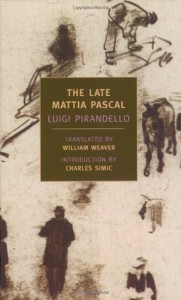Currently reading
How the World Works
The English Auden: Poems, Essays and Dramatic Writings, 1927-1939
Auden Generation: Literature and Politics in England in the 1930's
Collected Poems
The Late Mattia Pascal
 The title of this novel is a spoiler and the rest of the plot is adequately summarised on the back cover, so expect few surprises and you will not be disappointed. The task of this novel, then, is to provide a believable account that matches the plot outline. In the event, this is accomplished with style, but I make allowances for the fact that any work in translation cannot really be used to judge the quality of the original writing in its own language. It is an amusing story and I found it worth reading for its own sake. What more is required of a decent novel?
The title of this novel is a spoiler and the rest of the plot is adequately summarised on the back cover, so expect few surprises and you will not be disappointed. The task of this novel, then, is to provide a believable account that matches the plot outline. In the event, this is accomplished with style, but I make allowances for the fact that any work in translation cannot really be used to judge the quality of the original writing in its own language. It is an amusing story and I found it worth reading for its own sake. What more is required of a decent novel? Pirandello is a philosophical writer and after the end of the story (so it can be ignored if you just want a good read) ) he has supplied a short essay about realism which I enjoyed and which has connections with other reviews of mine earlier in the year, notably The New Journalism. I would also expect connections with the long running discussion of the nature of drama and especially tragedy, going back to the Greeks, which is hardly surprising in a dramatist. He draws interesting parallels between the search for realism in fiction and the absurdity of life itself as we live it behind masks. Again, this theme ties to other reviews of mine, not least of a psychotherapy book: Love's Executioner and Other Tales of Psychotherapy by Irvin D. Yalom. It seems that I manage to pick out the books I need for the topics that matter to me, even though from diverse and unexpected directions, or alternatively that I interpret everything I read in accordance with my own interests.
Life’s absurdities don’t have to seem believable, because they are real. As opposed to art’s absurdities which, to seem real, have to be believable. Then when they are believable, they are no longer absurd.
An event in life may be absurd; a work of art, if it is a work of art, cannot be.
It therefore follows that to criticize, in the name of life, a work of art for being absurd and unbelievable is sheer stupidity.
We cannot judge an artist’s world with criteria derived from any place except that world.
Alas, today’s every reality is necessarily destined to prove an illusion tomorrow, but a necessary illusion, since outside of it, unfortunately, there is no other reality for us. What if the significance consisted precisely in this, that a man or woman placed, by himself or by others, in a painful situation, socially abnormal, absurd if you like, remains in it, bears it, plays it out in front of others, as long as he himself doesn’t see it, whether through blindness or through incredible good faith? As soon as he sees it, as if a mirror had been set in front of him, he can no longer bear it, he feels all its horrors and breaks it, of if he can’t break it, he feels that it will kill him. Or if the significance consisted in this: that a socially abnormal situation is accepted, even when seen in a mirror, which in this case holds our illusion up to us; and then we play it out, suffering all its pain, as long as the performance is possible behind the stifling masks that we have put on ourselves or that others, or cruel necessity, have forced on us; in other words, as long as beneath this mask some keenly felt feeling of ours isn’t hurt there? Then the rebellion finally breaks out, and that mask is torn off and trampled underfoot.
I believe that my imagination is only to be congratulated if, with all its scruples, it has managed to make the defects it chose seem real, the defects of that fictitious construction the characters themselves have built of their personalities and their lives; or that others have built for them: the defects, in short, of the mask until it is revealed as naked.







